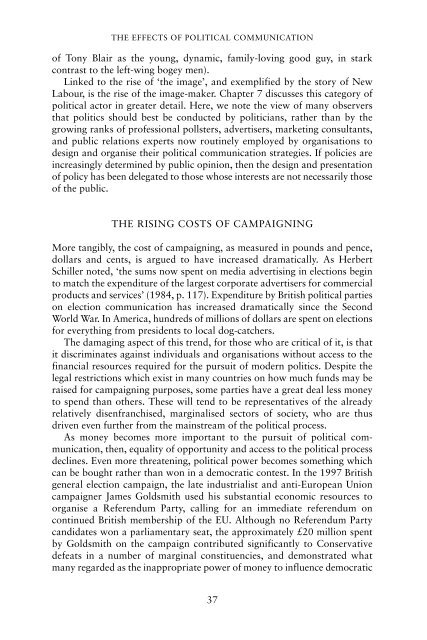20130412164339753295_book_an-introduction-to-political-communication
20130412164339753295_book_an-introduction-to-political-communication
20130412164339753295_book_an-introduction-to-political-communication
You also want an ePaper? Increase the reach of your titles
YUMPU automatically turns print PDFs into web optimized ePapers that Google loves.
THE EFFECTS OF POLITICAL COMMUNICATION<br />
of Tony Blair as the young, dynamic, family-loving good guy, in stark<br />
contrast <strong>to</strong> the left-wing bogey men).<br />
Linked <strong>to</strong> the rise of ‘the image’, <strong>an</strong>d exemplified by the s<strong>to</strong>ry of New<br />
Labour, is the rise of the image-maker. Chapter 7 discusses this category of<br />
<strong>political</strong> ac<strong>to</strong>r in greater detail. Here, we note the view of m<strong>an</strong>y observers<br />
that politics should best be conducted by politici<strong>an</strong>s, rather th<strong>an</strong> by the<br />
growing r<strong>an</strong>ks of professional pollsters, advertisers, marketing consult<strong>an</strong>ts,<br />
<strong>an</strong>d public relations experts now routinely employed by org<strong>an</strong>isations <strong>to</strong><br />
design <strong>an</strong>d org<strong>an</strong>ise their <strong>political</strong> <strong>communication</strong> strategies. If policies are<br />
increasingly determined by public opinion, then the design <strong>an</strong>d presentation<br />
of policy has been delegated <strong>to</strong> those whose interests are not necessarily those<br />
of the public.<br />
THE RISING COSTS OF CAMPAIGNING<br />
More t<strong>an</strong>gibly, the cost of campaigning, as measured in pounds <strong>an</strong>d pence,<br />
dollars <strong>an</strong>d cents, is argued <strong>to</strong> have increased dramatically. As Herbert<br />
Schiller noted, ‘the sums now spent on media advertising in elections begin<br />
<strong>to</strong> match the expenditure of the largest corporate advertisers for commercial<br />
products <strong>an</strong>d services’ (1984, p. 117). Expenditure by British <strong>political</strong> parties<br />
on election <strong>communication</strong> has increased dramatically since the Second<br />
World War. In America, hundreds of millions of dollars are spent on elections<br />
for everything from presidents <strong>to</strong> local dog-catchers.<br />
The damaging aspect of this trend, for those who are critical of it, is that<br />
it discriminates against individuals <strong>an</strong>d org<strong>an</strong>isations without access <strong>to</strong> the<br />
fin<strong>an</strong>cial resources required for the pursuit of modern politics. Despite the<br />
legal restrictions which exist in m<strong>an</strong>y countries on how much funds may be<br />
raised for campaigning purposes, some parties have a great deal less money<br />
<strong>to</strong> spend th<strong>an</strong> others. These will tend <strong>to</strong> be representatives of the already<br />
relatively disenfr<strong>an</strong>chised, marginalised sec<strong>to</strong>rs of society, who are thus<br />
driven even further from the mainstream of the <strong>political</strong> process.<br />
As money becomes more import<strong>an</strong>t <strong>to</strong> the pursuit of <strong>political</strong> <strong>communication</strong>,<br />
then, equality of opportunity <strong>an</strong>d access <strong>to</strong> the <strong>political</strong> process<br />
declines. Even more threatening, <strong>political</strong> power becomes something which<br />
c<strong>an</strong> be bought rather th<strong>an</strong> won in a democratic contest. In the 1997 British<br />
general election campaign, the late industrialist <strong>an</strong>d <strong>an</strong>ti-Europe<strong>an</strong> Union<br />
campaigner James Goldsmith used his subst<strong>an</strong>tial economic resources <strong>to</strong><br />
org<strong>an</strong>ise a Referendum Party, calling for <strong>an</strong> immediate referendum on<br />
continued British membership of the EU. Although no Referendum Party<br />
c<strong>an</strong>didates won a parliamentary seat, the approximately £20 million spent<br />
by Goldsmith on the campaign contributed signific<strong>an</strong>tly <strong>to</strong> Conservative<br />
defeats in a number of marginal constituencies, <strong>an</strong>d demonstrated what<br />
m<strong>an</strong>y regarded as the inappropriate power of money <strong>to</strong> influence democratic<br />
37
















